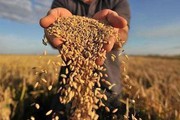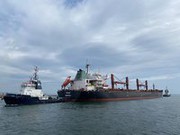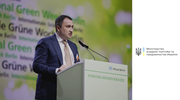News From Agro-Industrial Complex
Mykola Solskyi discusses financial support for Ukrainian farmers with his British counterpart Mark Steven Spencer
Mykola Solskyi, Minister of Agrarian Policy and Food of Ukraine, held an online working meeting with Mark Steven Spencer, Minister of State at the UK Department for Environment, Food and Rural Affairs.
During the meeting, the parties discussed the urgent problems of the Ukrainian agricultural sector and financial support for Ukrainian farmers.
- Read more
- 491 reads
Trade openness and integration into EU internal market are key to preserving Ukrainian economy in times of war and rapid economic recovery: Yuliia Svyrydenko
Amid the war, the EU has become Ukraine’s main trading partner, accounting for more than 55% of mutual trade. Now it is important for us to maintain the pace of trade development and extend autonomous trade measures in the form of complete elimination of duties, as well as to extend agreements on road transport permits. This was emphasized by Yuliia Svyrydenko, First Deputy Prime Minister and Minister of Economy of Ukraine, at the EU-Ukraine Summit.
- Read more
- 361 reads
53.2 million tons of grain and leguminous crops were harvested in Ukraine
As of February 2, 2023, grain and leguminous crops were harvested on an area of 11.1 million hectares (97%) with a yield of 4.79 t/ha, 53.2 million tons of grain were threshed, including:
- Read more
- 531 reads
Mykola Solskyi called on EU to help Ukraine with spring sowing campaign
The Minister of Agrarian Policy and Food of Ukraine Mykola Solskyi called on EU representatives to support Ukrainian farmers and facilitate the spring sowing campaign. He stated this during his speech at a joint meeting of the Cabinet of Ministers of Ukraine and the European Commission College, which was held in Kyiv for the first time.
- Read more
- 365 reads
We expect duty-free trade with the EU to be extended until the end of 2024: Denys Shmyhal
Ukraine plans to make significant progress in its integration into the EU's internal market and to maintain duty-free trade with the European Union until the end of 2024.
These issues were among the topics of discussion during the meeting of Prime Minister of Ukraine Denys Shmyhal and Minister of Finance Sergii Marchenko with Executive Vice-President of the European Commission Valdis Dombrovskis.
- Read more
- 367 reads
UN assures Black Sea Grain Initiative will continue
The Black Sea Grain Initiative is not blocked, work is underway to continue it, UN system coordinator in Ukraine Denise Brown said.
- Read more
- 325 reads
EU will consider ways to support Ukraine’s agricultural sector
On January 30, the EU Agriculture and Fisheries Council in Brussels will, among other issues, reaffirm solidarity with Ukraine and consider further ways to support its agricultural sector.
- Read more
- 454 reads
Ukraine has already sent almost 240 thousand tons of wheat to Ethiopia, which is on the edge of famine
Since the beginning of this year, Ukraine has shipped 194.4 thousand tons of agricultural products to Africa on 8 vessels, including 46.5 thousand tons of wheat. In particular, the fourth vessel as a part of the initiative «Grain from Ukraine» has recently left the port of Chornomorsk. The name of the ship is AMIRA HANA and it will deliver 30 thousand tons of wheat to the port of Djibouti, and from there the Ukrainian grain will be shipped to Ethiopia. In total, Ukraine has already delivered 238.3 thousand tons of wheat to Ethiopia, which is on the edge of famine.
- Read more
- 464 reads
Even in the conditions of war, Ukraine is among the world's top 5 agricultural exporters, - Mykola Solskyi
The Minister of Agrarian Policy and Food of Ukraine Mr. Mykola Solskyi in his speech at the opening of the International Green Week spoke about the key food challenges and the ways to overcome them.
One of these challenges is the blocking of Ukrainian agricultural exports, both at the beginning of the full-scale war with Russia and today, due to artificial inspections of ships at the Bosporus, which cause turbulence in food markets. As a result, food prices are rising and the food crisis is getting worse.
- Read more
- 484 reads
Grain Initiative: the world loses millions of tons of Ukrainian foodstuffs every month due to Russian sabotage of ship inspections in the Bosporus
17.8 million tons of Ukrainian agricultural products on 659 vessels have been exported from the ports of Odesa, Chornomorsk, and Pivdennyi to 40 countries since August 1, 2022. Since the grain deal was agreed 3 ports had sent 659 ships with food to Africa, Asia, and Europe, and 643 - received new ones for loading with products from Ukrainian farmers.
If the corridor had functioned fully, Ukraine would have exported at least 25-29 million tons of foodstuff to world markets. Thus, since October, Ukrainian ports have been forced to work at half their capacity, the volume of the fleet entering the ports for loading has decreased, and the volume of exports has decreased by 3 million tons per month.
The main reason is the purposeful sabotage of inspections of ships in the Bosporus by the Russian side, which leads to a consistently long queue of more than 100 ships.
- Read more
- 415 reads

















